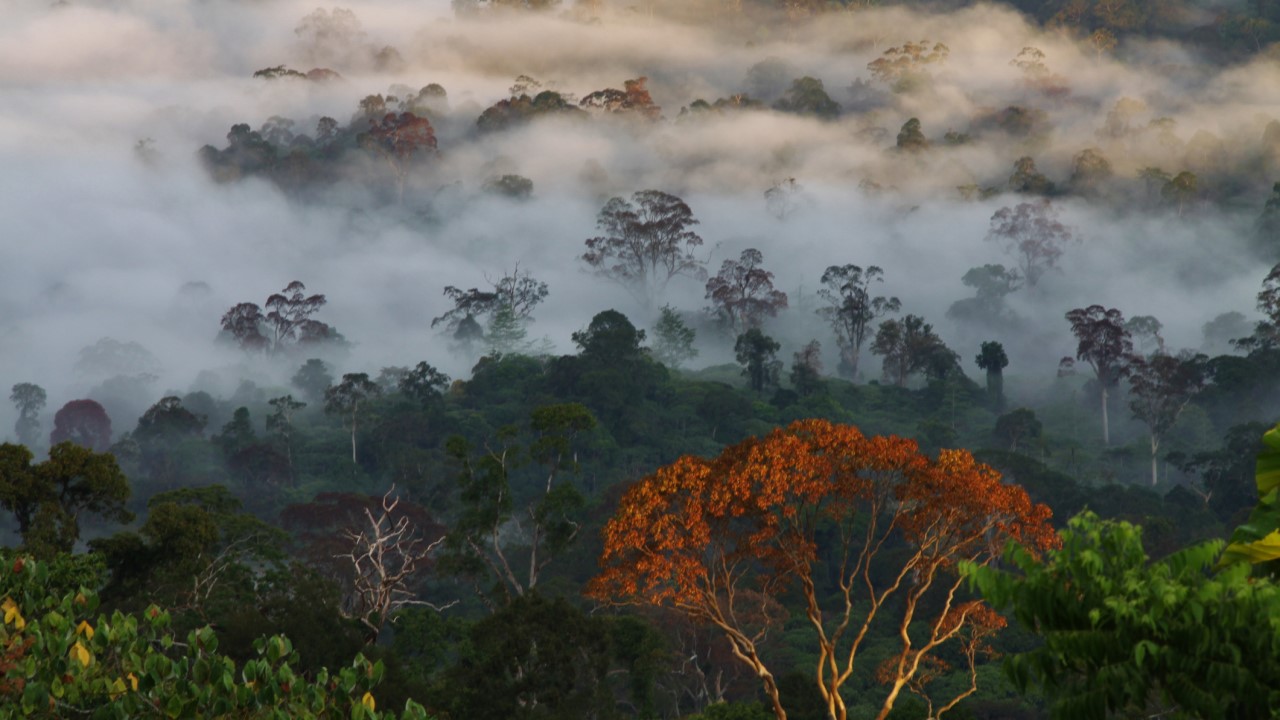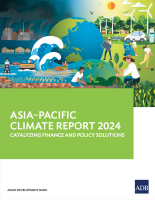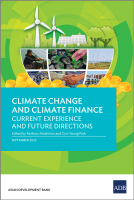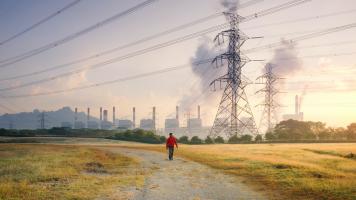
Kuamut and other rainforests on the island of Borneo are known collectively as the Heart of Borneo. They make up about a third of Asia’s largest island and serve as the “lungs of the earth,” drawing in carbon dioxide from the atmosphere and breathing out oxygen. Photo credit: iStock/Jason T. Mulvaney.
The annual emission reduction from the Kuamut Rainforest Conservation Project is estimated at more than 800,000 tonnes of carbon dioxide equivalent.
Located in the Tongod and Kinabatangan districts of Sabah, the Kuamut rainforest is an important tropical forest habitat in Malaysian Borneo. It is home to large populations of elephants, banteng (a species of wild cattle), and orangutan. It supports endangered bird species, such as the Helmeted hornbill, Bornean peacock pheasant, and Storm’s stork.
A public–private partnership project is not only protecting and conserving the biodiversity value of Kuamut but also contributing to climate mitigation through carbon sequestration and by avoiding emissions from commercial logging and forest degradation. It is the first certified nature-based carbon project in the country. In March, it generated its first tranche of verified carbon units under Verra’s Verified Carbon Standard—an estimated annual emission reduction of more than 800,000 tonnes of carbon dioxide equivalent (tCO2e).
Last July, Bursa Carbon Exchange (BCX) carried out its first Malaysian carbon credit auction with carbon credits from the Kuamut Rainforest Conservation Project. It is also BCX’s first offering of Malaysia Nature-based Carbon Credits Plus (MNC+) generated via a domestic forestry project.
A subsidiary of Bursa Malaysia, BCX is a global spot exchange that enables corporates to take practical climate mitigation action through the trading of carbon credits from projects with measurable climate action outcomes that adhere to the international standards.
The auction established a benchmark price for voluntary carbon credits for domestic nature-based carbon projects at 50 ringgit ($12) per contract. The successful bidders included national oil and gas company Petroliam Nasional Bhd (Petronas) and three publicly listed companies—Malayan Banking Bhd (Maybank), Gas Malaysia Bhd, and Yinson Holdings Bhd.
On 11 September, Malaysian Airlines announced that it will begin offering carbon credits from the Kuamut project as part of its carbon offset program for passengers and corporate clients. Through the airline’s booking platform and MHcorporate portal, travelers and corporate customers can help offset the carbon emissions from their flights by selecting the rainforest conservation project as one of the available climate projects in the voluntary program.
Voluntary carbon market
The global air transport sector, which committed in 2021 to achieve net-zero carbon emissions by 2050, is one of the hardest-to-abate sectors that are expected to turn to carbon markets to offset their emissions. The other industries, where 100% decarbonization is still difficult, include cement, chemicals, and steel.
The demand for credible carbon credits is expected to increase as the world struggles to meet climate goals. In the voluntary carbon market, each credit traded is equivalent to 1 ton of tCO2e that is either sequestered or not emitted.
A study shows that nature can provide more than one-third of the global emissions reductions needed by 2030. According to one estimate, carbon credits from forestry and land use projects accounted for more than half of transactions in 2021.
Co-benefits of the project
The rainforest conservation project is developed and managed by a public-private partnership involving the Sabah Forestry Department, Yayasan Sabah, Rakyat Berjaya, and Permian Global (Malaysia), with support from PACOS Trust and the Southeast Asia Rainforest Research Partnership (SEARRP). According to Permian Global, the project is protecting and restoring 83,381 hectares of tropical forest within a 1-million-hectare concession managed by Yayasan Sabah. Over the next 30 years, it aims to prevent the release of 16 million tonnes of CO2e.
The Kuamut project has earned international recognition and is rated best in class, as one of the highest-rated improved forest management projects in the world by the carbon rating agency BeZero Carbon. A key significance of this project is that it delivers tangible climate, community, and biodiversity co-benefits, earning itself a Gold Level for Climate status under the Climate, Community and Biodiversity (CCB) Standards.
The project is helping improve the livelihood and wellbeing of Kuamut and the Karamuak communities who live 10 kilometers north and northeast of the forest reserve. It has created jobs, supported sustainable local businesses, and jointly designed social development programs (i.e., education, health) with the communities.
For Malaysia, BCX added that the project is of national importance as it demonstrates that the country’s forests can successfully yield high-integrity carbon credits. It lays the path for other states to preserve their natural resources and maintain at least 50% of land under forest and tree cover, in line with the nation’s pledge during the Earth Summit in 1992.

BIMP-EAGA
The Brunei Darussalam–Indonesia–Malaysia–Philippines East ASEAN Growth Area, or BIMP-EAGA, is a cooperation initiative established in 1994 to spur development in remote and less developed areas in the four participating Southeast Asian countries.


